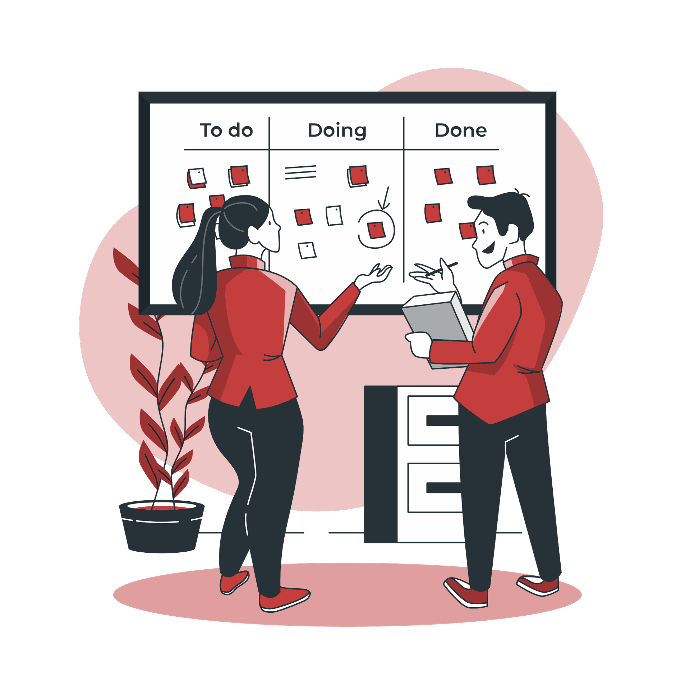Odoo Implementation
Implementation of the ERP system is a complicated process in business digitalization. Performing a set of sequential actions is necessary for the project to be successfully implemented. This includes transforming enterprise information systems and business processes and a deep understanding of organizational needs, gaps, and opportunities.

Odoo is suitable for businesses of all sizes
SMEs
Odoo helps digitize core business processes such as accounting, customer management, and sales. Odoo's core functionality provides many options to automate everyday life.
Large
Provides complete process automation and the ability to tailor the development of specific functional needs. All company processes are digitized: accounting, HR, warehouse, production, etc.
Odoo Implementation Process
Initiation
This stage involves getting to know the client's business and obtaining as much information as possible about the processes. A GAP analysis is developed and prepared for the client, a demo database is created, and an estimate of the tasks carried out with the additional development is prepared.
Planning
The client and a business analyst mainly carry out the planning stage. The project plan, requirements, possible risks that may arise from both sides, and mitigation strategies are prepared for the client.
Execution
The implementation stage is the largest, taking up around 80% of the implementation process. It involves configuring the Odoo system, customizing modules, and training users in parallel—data import, which is migrating the client's existing data to Odoo. Additional development is carried out according to the needs of the project.
Closure
Once the implementation phase is concluded, it's time to launch and fully utilize the Odoo system in your business.
The Odoo project involves several users, each with their own role to play throughout the project. It is essential to achieve the project goal.
Request a ConsultationStage 1 - Initiation
Client
-
The client should be ready for the Kick-off meeting, giving us as much information as possible about the processes to get a complete overview of the business needs.
-
The client is expected to provide a product manager or owner from their side, who will be a single point of contact between the service provider and the end user.
-
They must accept the GAP analysis / approve the project.
Project Manager
- Initiates the project.
Business Analyst
-
Starts the "Kick-off" meeting.
-
Develops a feasibility study (GAP analysis).
Odoo Expert
-
Prepares a demo database with an appropriate initial configuration for a demonstration to the client.
-
Assesses the tasks that can be performed with Odoo standard functions for GAP analysis.
Developer
-
Makes an assessment in the GAP analysis of the tasks that require additional development.
GAP analysis - is an analytical process to determine how to achieve business goals best. It compares the current state with an ideal state or goals and offers solutions to business problems..
Midis GAP analysis Implementation Process
A GAP analysis is individual work with the client. The key to this process is to understand three important things:
- How work processes have worked in the company up to this point.
- The customer's vision, or how they want business processes to work in the future.
- Corresponding Odoo functionality.

Once we have studied a company's processes, we fully understand how they work. This is how we know which activities are essential and which can be excluded entirely. As a result, we have come across a way to effectively and efficiently implement the digitalization of necessary processes. Based on that, we come to the capabilities and functionality of Odoo. Here we divide it into groups and priorities.
Request a ConsultationBasic Functions
Odoo ERP covers a wide range of business functions built into the system but not activated by default. By targeting each business individually, system optimization is based on various business factors that affect the use of ERP
Additional Development
Additional development is changing functionality by adding programming code to a system or creating a standalone app from scratch.
Development is only carried out in cases where specific business needs must be met that cannot be configured or where such functionalities need to be built into the Odoo system.
Data Import
Importing data is not always the most uncomplicated process. Each company is individual, and the information stored in the database is implemented according to its own standards. Therefore, essential preparations must be made to ensure that the process is as efficient as possible and that the imported data is stored correctly and without loss in the Odoo system.
Integration with Third-Party Systems
In cases where it is essential for the customer to use third-party software and there is no ready-made app in the Odoo app store, we offer integration options.
Community Apps
The Odoo app store has a wide range of ready-made apps developed by community partners. We evaluate the possibility of integrating community apps where they can cover the functionality required by our customers, which reduces both the time needed to implement Odoo and the cost.
A Must-Have Functionality vs. a Should-Have Functionality
Higher Priority
The first group receives higher priority. This enables us to arrange delivery within the next two weeks. The first group is the standard Odoo functionality, which does not require additional development as it covers the basic business process needs. Upon receipt of the first delivery, the customer can already use and learn the Odoo system.
Lower Priority
The second group receives lower priority. This is due to the long lead time for implementation, as additional Odoo functionality will be developed. For complex projects, we can guarantee to implement within three to five months when there is a large amount of development of the required core and additional functionality. Our expertise and the architecture used for development and implementation allow us to guarantee service delivery every two weeks. This allows the customer to master the functionality gradually.
In the IT industry, there are many ways to implement a project. Our experts will guide you through the most popular ones so we can find the most efficient way to organize your project. The success story is when our customers start using Odoo and improve their processes.
Stage 2 - Planning
Client
-
Summarizes end-users' requirements and can decide on prioritization and changes to internal processes.
-
Reviews and approves the project plan.
-
Participates in project requirements reviews.
Business Analyst
-
Collects and processes requirements.
-
Creates space in the project management system and saves the project documentation.
-
Prepares/stores meeting notes in the project management system.
-
Creates data visualization if required.
What is Risk Management?
Risk management is identifying, monitoring, and managing potential risks to minimize their potential negative impact on the business. In addition, we determine, analyze, prioritize, and frequently monitor risks. Prepare yourself and your partners for all potential threats to be addressed during the project.
Request an Odoo demonstration!
We'll show you the system's features and how Odoo can improve your everyday life.
Stage 3 - Execution
Client
-
Provides input to the execution of the placement plan.
-
Collaborates to eliminate possible blocking factors or solve problems during the project.
-
Develops an overall understanding of the project completion, user acceptance testing organization, and project launch strategy.
Project Manager
-
Organizes a higher level of communication on project status and presents progress and data prepared for the report (from the Business Analyst).
-
Controls working hours, team resources, and budget with the client/gets approvals for additional hours or people to be involved.
-
Focuses on the schedule, keeps track of estimates, and notifies the client and the team of any changes to estimates if there are any sudden changes.
Business Analyst
-
Creates user stories.
-
Formulates and distributes tasks to developers.
-
Keeps customer and developer tasks organized in the project management tool.
-
Monitors the process of development and implementation.
-
Collects and compiles data on progress and presents results to the project manager.
Odoo Expert
-
Prepares the test environment configuration.
-
Designs import templates (products, contacts, etc.)
Developer
-
Creates the testing environment for the client and the development team.
-
Discusses and analyzes the tasks, offering possible solutions from a technical perspective.
-
Performs initial testing on the local environment for all features developed.
-
Ensures that all initially tested development is uploaded to the customer's test environment for others to see, test and demonstrate.
-
Completes the tasks in Jira/Odoo, describing what was done and ready for testing.
Excellent relationships with the customer are essential to us, and this is achieved through well-organized customer service and the quality of our company's services.
Customer Portal
We provide transparent cooperation to our customers. You can access our communication on the customer portal under the "My Account" section. All necessary documents are available at any time as:
-
Sales Quotations;
-
Sales Orders;
-
Invoices;
-
Projects;
-
Tasks;
-
Tickets.

Stage 4 - Closure
Client
-
Organizes user acceptance testing on their side before the final rollout.
-
Manages their employees for training sessions or Odoo learning.
-
Assists in launching the project in the production environment.
-
Accepts and approves the project delivery documentation.
Project Manager
-
Analyzes team performance.
-
Conducts post-implementation reviews.
-
Performs accounting for the project.
-
Documents project closure.
Business Analyst
-
Analyzes project performance.
-
Provides reporting for complete tasks and completion of a project plan.
Odoo Expert
-
Manage customer employee user training.
-
Helps with setting up a proper configuration for the customer's production environment.
Developer
-
Makes appropriate changes in developed features if needed once a task is returned from testing.
-
Rolls out tested, developed features to the production environment.
Our best practice shows that customers who are actively involved in the project and regularly follow the progress on the Odoo Customer Portal can realize their goals faster.
We can be described as F3 (the first in Latvia) in Odoo implementation:
Implementers of the Odoo System!
Silver Partners!
With localized Accounting!
Book a consultation to find out what Odoo can do for your business!

